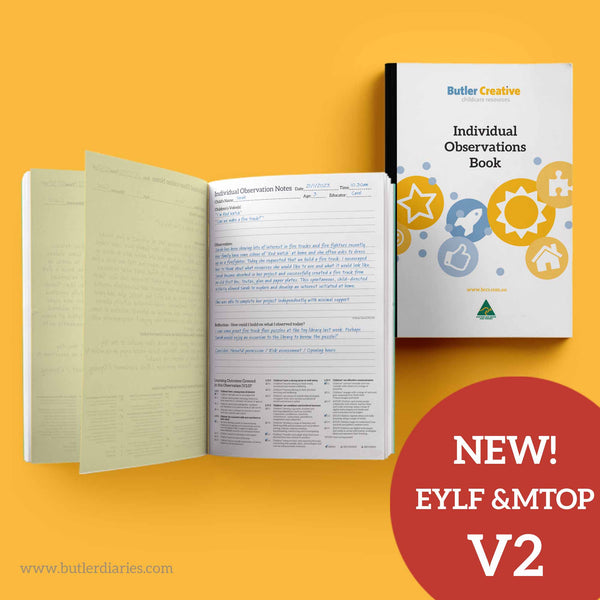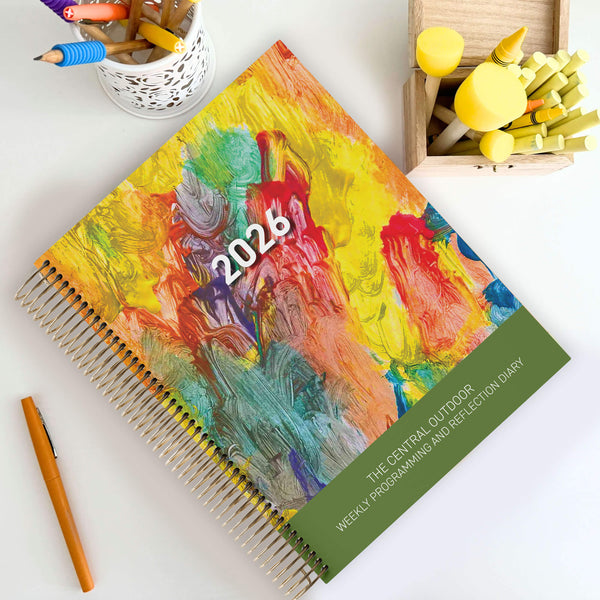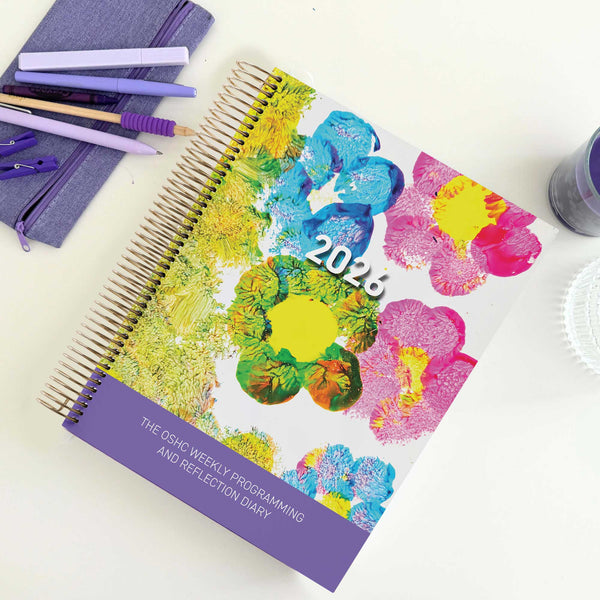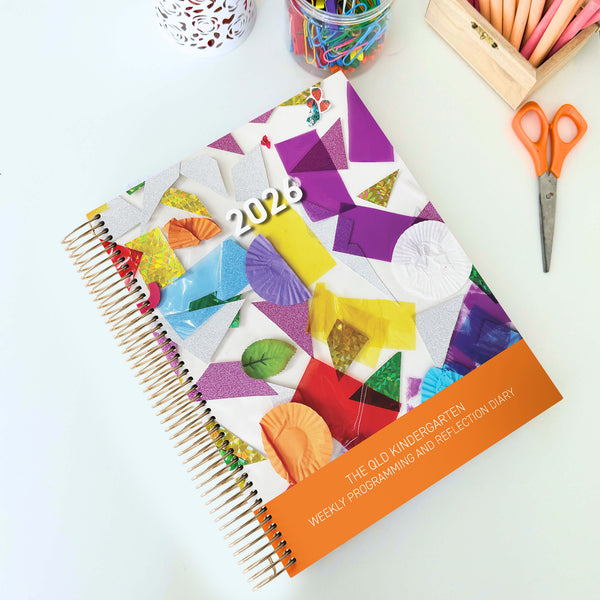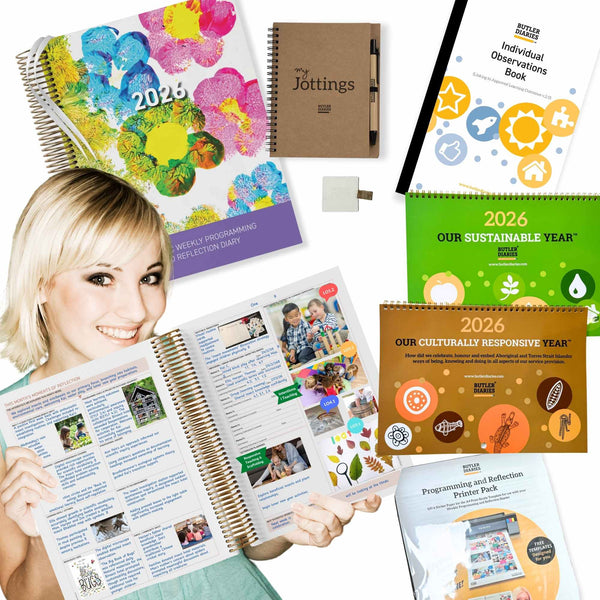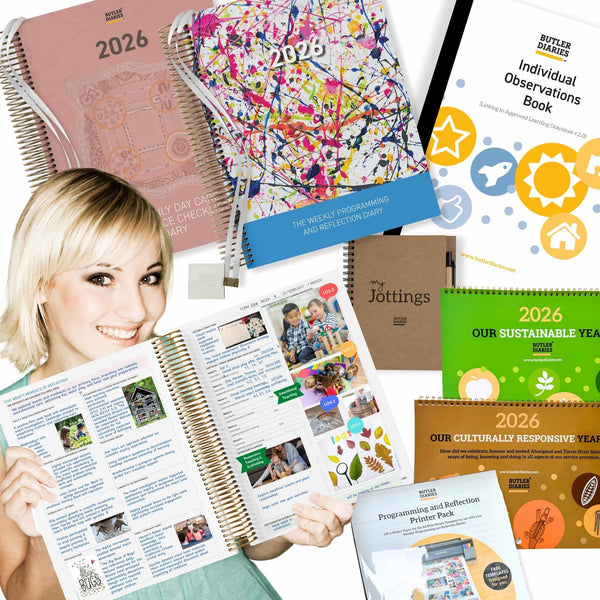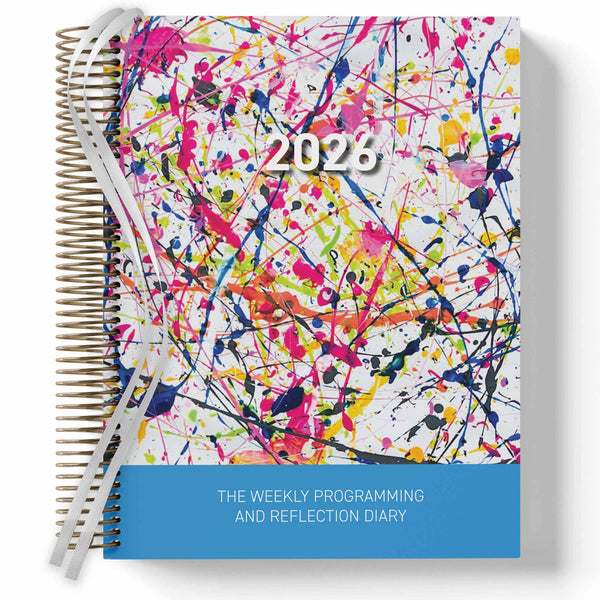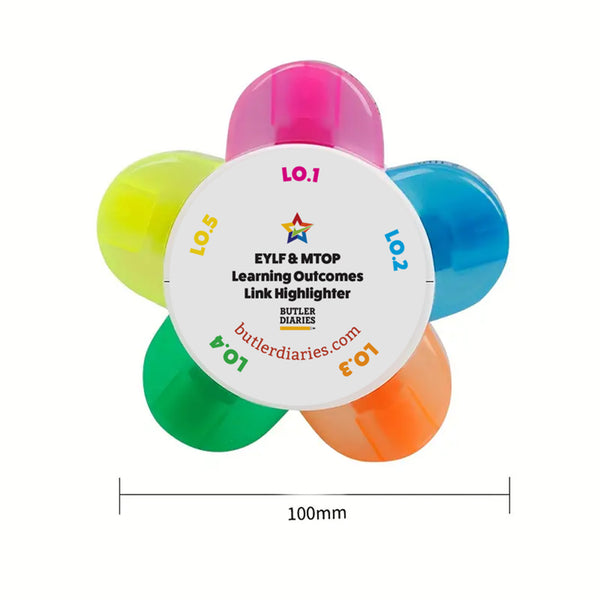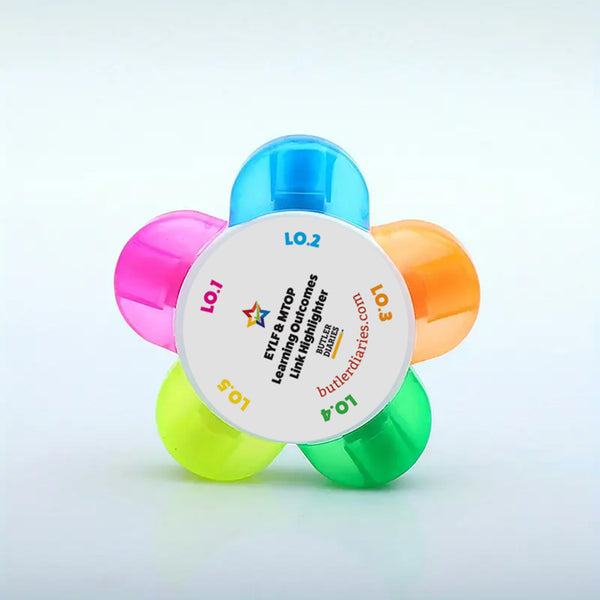This article provides tips relevant to the:
- Weekly Programming and Reflection Diary designed to be used for both Long Day Care and Family Day Care purposes in all states of Australia that operate under the Early Years Learning Framework.
- QLD Weekly Programming and Reflection Diary designed to be used for QLD Kindergartens under the Queensland Kindergarten Learning Guidelines.
- OSHC Weekly Programming and Reflection Diary designed to be used for OSHC purposes in all states of Australia that operate under the My Time, Our Place Framework.
Our Programming Diaries will professionalise, yet simplify your workload and your ‘Creative Thinking Program’ can be displayed for families, educators, and assessors.
With your weekly programs and reflections on open spreads, it enables you to open this book at any time and view each week at a glance.
Pre-planning parts of the following week’s program based on reflections from the previous week encourages intentionality within the planning cycle. At the same time, allowing the rest of the program to evolve as it unfolds promotes a child-led approach.
THE BUTLER METHOD CREATIVE THINKING PROGRAM:
- This program is created with a space to take notes based on interests, family input, ideas, follow-ups, ‘notes to self’ or other professional’s input.
- Outcomes implemented throughout the week are included to link to the program.
- The Butler Method enables you to connect and link interests/outcomes so you can extend and scaffold learning in the following week’s program.
- Not every box is required to be completed every week and will depend on how many children are in the room, their ages, and interests.
- You can make your cycle even more visible by using symbols, dates, and children’s initials to show the cycle of planning for e.g. Tongs & Coloured Balls, Mary D., ~ 1/3 O, which means the experience is set up for Mary as an extension on an observation taken on the 1/3. If I look back at my program on the 1/3, I should see the original experience and observation note. There are examples showing the cycle of planning on our blog.
THIS WEEK’S MOMENTS OF REFLECTION:
Is designed to highlight interests that have emerged throughout your weekly program and help maintain a child-directed program.
You can update your reflection daily whilst your program emerges or complete it from a holistic perspective at the end of the week.
The spaces provided can include wallet-sized prints, cut to desired fit to show images reflecting your comments throughout plus an additional column
for extra photographic evidence.
This results in prompting critical reflection that is easily explained, visually impressive, and informative for following programs and ‘snap’ inspections.
Avoid simply describing what took place throughout the week and instead critically reflect by examining the “why” behind actions and considering deeper factors such as personal values, societal influences, and pedagogical theories – this promotes meaningful change and professional growth.
You do not have to reflect in every box every week, they are just designed as prompts to be used as suited.

Each space provided is open for interpretation and a guideline only to encourage critical reflection within NQS guidelines. We’ve provided some example questions you could ask yourself to promote critical reflection, you may ask yourself one, several or none of these questions in your reflection:
- Was it a good/challenging week? Why? This is where you have the opportunity to briefly and honestly express how you feel your week went. Did you have a wonder-filled week or did you find it somewhat frustrating? What worked? What didn’t? Why? What could you have done differently? What decisions may have contributed to the way the week felt?
- Were programmed goals & projected outcomes achieved? Perhaps you over-planned and did not find time to achieve all you set out to achieve or you made assumptions about children’s learning or behaviour. How could you improve your approach? Did your goals and projected outcomes align with children’s interests? Were your intentional teaching methods successful in supporting your programmed goals and projected outcomes? Why?
- Intentional teaching/Learning experiences covered: What actions did you take throughout the week that were deliberate teaching opportunities? For example: This may be a planned group learning experience or it may happen spontaneously in a small group whilst playing with an activity of interest (e.g. role-modelling cause and effect while playing with blocks). Were the strategies successful for all children? Why? Did you adapt strategies for different children and during different learning experiences? How could you better decide what intentional teaching strategies would be most beneficial?
- Professional Inquiry: This may relate to reflections around professional development, research, reflective discussions with other professionals, or other resources. You might also want to use this space to link to theorists in ECEC, principles, practices, code of ethics, or other professional knowledge source. What key messaging came from your professional inquiry and how can you use it to better inform your practice and program? What practices occurred this week that were informed by professional inquiry? Were they successful in your teaching context? How did you challenge your own values, biases, or opinions?
- Learning Data/Jottings: This space is designed to critically reflect on general learning experiences. You may reflect on an individual or group observation taken throughout the week or a particular experience that emerged. Use this data to inform future planning for that child/ children by updating goals, interests, or the direction of the following week’s program. This space can be helpful when considering if any voices were missing from your program and how to better ensure they are all heard.
- Changes to Environment: What changes did you make to the environment during the week? Why did you make those changes? What was the goal or learning you hoped to achieve? Was it successful? Why/why not? Do the spaces allow all children to participate? Does the space encourage self regulation? Will you continue the space or make further changes in the following week?
- Resources Used: Similar to the above, this focuses on the resources used and the intentional decision making behind those resources. What were your goals? Were they successful? Were the resources suitable in number? Did they allow all children to engage with the experience? Do they promote high expectations and equity? Are they inclusive? Do they represent stereotypes? Are they sustainable, long-term resources? Are they ethically sourced? How can we improve the resources we have available?
- Family and Community Input: A space to record conversation, suggestions, concerns, self-inclusion, cultural background knowledge or the like where parents raise an awareness or contribute to the program. Use this information to inform future planning and update child’s goals or information as needed.
- Routine & transitions: Is there anything that could be done to make your day more fluent? Were your transitions effective? Did the children have enough time? How much time was spent ‘waiting’? How could you improve learning opportunities during routines and transitions? Are children provided opportunity for agency, self-regulation and celebration during routines and transitions?
- Individual Observations: This ensures that up to six observations are recorded and achieved each week. This is particularly useful for tracking the frequency of individual observations in FDC. (Please note that LDC may require more space in this area, perhaps using this space to record large or small group observations and coding the program itself for individual observations. We also have our Individual Observations Duplicate Book for more detailed observations).
- Extension Planning: The final box to complete relates to the question: Where to from here? An overview of what learning you would like to explore during the next week based upon the week that was.
Please feel free to adapt and use the diary in any way that suits you best. If you would like more information or clarification, learn more about the Butler Method at www.butlerdiaries.com or please email info@butlerdiaries.com.
See this article for some examples of how the diary can be used or this article for answers to frequently asked questions.
See here another way it is used by Educator Youtuber StoryKate!
Existing customers can also find ongoing examples, help and support in our Facebook Community Group.









